MASSA Business Mission to Dili, Timor-Leste from 12 – 15 October 2015
TIMOR-LESTE IN BRIEF
Source: CIA World Fact Book www.cia.gov
| Country Name | Democratic Republic of Timor-Leste |
| Location | Southeastern Asia, northwest of Australia in the Lesser Sunda Islands at the eastern end of the Indonesian archipelago; note – Timor-Leste includes the eastern half of the island of Timor, the Oecussi (Ambeno) region on the northwest portion of the island of Timor, and the islands of Pulau Atauro and Pulau Jaco. |
| Area | 14,874 sq.km. |
| Climate | tropical; hot, humid; distinct rainy and dry seasons |
| Terrain | Mountainous |
| Natural resources | gold, petroleum, natural gas, manganese, marble |
| Land use | agricultural land: 25.1%; arable land 10.1%; permanent crops 4.9%; permanent pasture 10.1%; forest: 49.1%; other: 25.8% (2011 est.) |
| Ethnic groups | Austronesian (Malayo-Polynesian, Papuan, small Chinese minority |
| Population | 1,231,116 (July 2015 est) |
| Religions | Roman Catholic 96.9%, Protestant / Evangelical 2.2%, Muslim 0.3%, other 0.6% (2005) |
| Legal system | civil law system based on the Portuguese model; note – penal and civil law codes to replace the Indonesian codes were passed by Parliament and promulgated in 2009 and 2011, respectively |
| Chief of State | President Taur Matan RUAK, aka Jose Maria de VASCONCELOS (since 20 May 2012); note – the president plays a largely symbolic role but is the commander in chief of the military and is able to veto legislation, dissolve parliament, and call national elections. |
| Head of Government | Prime Minister Dr. Rui Maria de Araújo (since February 2015) |
| Economy | Overview: Since gaining its independence in 1999, Timor-Leste has faced great challenges in rebuilding its infrastructure, strengthening the civil administration, and generating jobs for young people entering the work force. The development of oil and gas resources in offshore waters has greatly supplemented government revenues. This technology-intensive industry, however, has done little to create jobs in part because there are no production facilities in Timor-Leste. Gas is currently piped to Australia for processing, but Timor-Leste has expressed interest in developing a domestic processing capacity. In June 2005, the National Parliament unanimously approved the creation of a Petroleum Fund to serve as a repository for all petroleum revenues and to preserve the value of Timor-Leste’s petroleum wealth for future generations. The Fund held assets of $16.5 billion, as of December 2014. Oil accounts for 90% of government revenues, and the drop in the price of oil in 2014 has led to concerns about the long-term sustainability of government spending. The Ministry of Finance maintains that the Petroleum Fund is sufficient to sustain government operations for the foreseeable future. Annual government budget expenditures increased markedly between 2009 and 2012 but dropped significantly in 2013 and again in 2014. Historically, the government has failed to spend as much as its budget allowed. The government has focused significant resources on basic infrastructure, including electricity and roads. Limited experience in procurement and infrastructure building has hampered these projects. The underlying economic policy challenge the country faces remains how best to use oil-and-gas wealth to lift the non-oil economy onto a higher growth path and to reduce poverty. |
| GDP- real growth rate | 6.6% (2014 est.) |
| GDP – per capita (PPP) | US$4,900 (2014 est.) |
| Agriculture – products | coffee, rice, corn, cassava (manioc, tapioca), sweet potatoes, soybeans, cabbage, mangoes, bananas, vanilla |
| Industries | printing, soap manufacturing, handicrafts, woven cloth |
| Exports | $154 million (2012 est.) – oil, coffee, sandalwood, marble. Potential for vanilla exports |
| Imports | $696.2 million (2013 est.) – food, gasoline, kerosene, machinery |
| Energy – Electricity production | 349.4 million kWh (2012 est.)Electricity consumption: 125.3 million kWh (2012 est.) |
| Crude oil | Production: 79,260 bbl/day (2013 est.)Exports : 77,280 bbl/day (2013 est.)Refined petroleum products – imports: 1,264 bbl/day (2012 est.) |
The official languages of Timor-Leste are Portuguese and Tetum. Bahasa Indonesia and English are the primary business languages. Bahasa Indonesia is widely spoken in Timor-Leste.
Timor-Leste is ranked 172 in doing business in the region of East Asia & Pacific. The Income category of Timor-Leste is Lower Middle Income with GNI Per Capita (US$) at 3,580.
Following are some of the Positive Factors in doing business in Timor-Leste:-
– A Specialised Investment Agency (www.invest-tl.com) – one stop shop for business registration
– Electricity availability
– Competitive tax regime
– Financially sound country (oil fund)
– Stable and safe for foreigners
The Challenging Factors in the business environment in Timor-Leste would include:-
– Education level low but trainability is good
– Legal system, including registration of properties
– Strained infrastructures (port, airport, roads)
– Cost of living
Business Opportunities available in Timor-Leste will be:-
– Port Construction Tibar Bar
– Airport Upgrade
– Roads Construction
– Water Sanitation
– Investment in Tourism
– Investment in Agribusiness
Customs and Logistics
Garuda, Silk Air, Air North and Sriwijaya are airlines that fly to Timor-Leste with direct flights from/to Singapore/Denpasar/Darwin.
Swire (China Navigation), Meratus, Pil and ANL (CMA Group) are shipping lines with direct service from Singapore/Surabaya/Darwin. Freight forwarding/Customs services are supported by SDV (www.sdv.com). SDV is also the agent for Swire, Meratus, Garuda, Air North and FEDEX in Timor Leste.
Informations on other customs and logistics services are:-
– Tax rate on imported goods is low (2.5% + 2.5% compounded on most
items).
– Local production is limited to coffee and artefacts (Tais = Ikat).
– Most containers are shipped back empty, possible to get very competitive
rates on export cargo.
– Current port is suffering congestion, and will ease up after opening of new
port in Tibar Bar.
MASSA BUSINESS MISSION TO DILI,
TIMOR-LESTE FROM 12-15 October 2015
1. Introduction
MASSA organised a Business Mission to Dili, Timor-Leste from 12 – 15 October 2015. 10 participants from 9 companies/organisation took part in the Business Mission. The mission was led by Tan Sri Dato’ Soong Siew Hoong, MASSA Executive Council Member.
The mission was organised as a follow-up to the visit of the Prime Minister of Timor-Leste to Malaysia in April 2014, whereby the Prime Minister had invited Malaysian businesses to avail to the trade, investment and business opportunities in the country. Potential investment sectors include:
a) Oil and gas
b) Fishery – currently mainly traditional fishing activities
c) Livestock – poultry, cattle, pigs, goats, etc
d) Agriculture (mainly coffee) – post harvest processing
e) Import substitution
f) Infrastructure and property development – Port construction, airport upgrade, roads, water sanitation, etc.
The meetings for the delegation were arranged with the kind assistance of the Embassy of Malaysia in Dili.
2. Objectives of the mission
The objectives of the Business Mission were:
a) To understand Timor-Leste’s policies, laws, rules, regulations, political, social and economic environments; business and work culture, etc.
b) To tap into the business opportunities, both trade and investments, that are available in Timor-Leste;
c) To source for resources that are available;
d) To look into setting up manufacturing facilities for import substitution;
e) To seek opportunities in the development of infrastructure, utilities, property and others projects.
3. Programme
3.1 The delegation met the Second Secretary of the Embassy of Malaysia in Dili, Encik Khairul Nazri Mohamed Taib at the Embassy, who gave a briefing to the delegation at the Embassy.
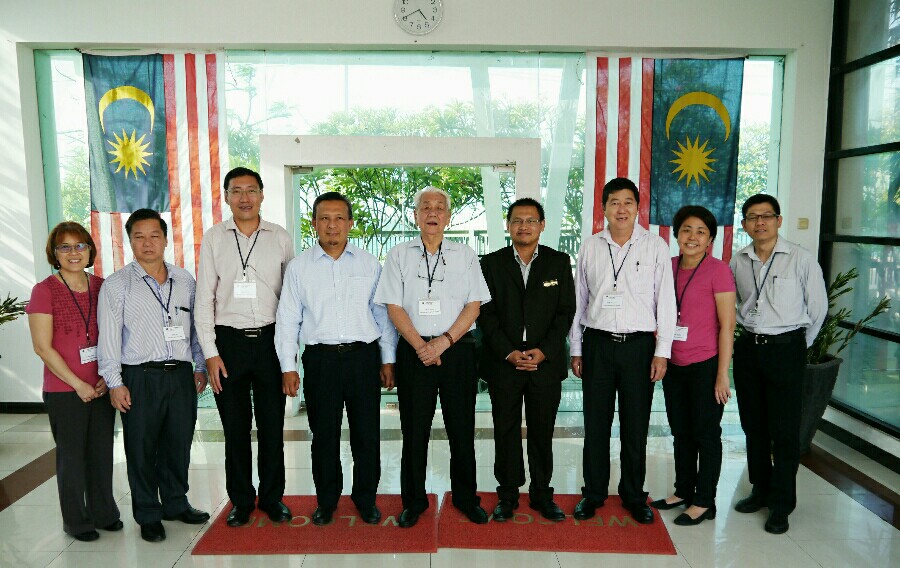
Mission members at the Embassy of Malaysia in Dili (left to right) Ms Florence Khoo (MASSA), Mr Siong Wee Heng (WH Skill Training Sdn Bhd), Mr Lim Hong Yeu (Kemajuan Arjaya Sdn Bhd), Mr Haji Mohamad Nizam B Ramli, (Second Secretary, Embassy of Malaysia in Dili) , Tan Sri Dato’ Soong Siew Hoong, (Mission Leader), Mr Khairul Nazri Mohamad Taib (Second Secretary, Embassy of Malaysia in Dili) Mr Seow Cheng Soon (Probase Manufacturing Sdn Bhd) Ms Soong Jean Penn (Planet Graphics Sdn Bhd) and Mr Tan Kok Han (Muhibbah Engineering (M) Bhd)
Secretariat of State for Arts and Culture
3.2 The delegation visited the Secretariat of State for Arts and Culture (website: www.cultura.gov.tl) and was met by the Director, Ms Maria Isabel de Jesus Ximenes. The Secretariat is tasked with preservation, safeguarding, maintaining and promoting Timor-Leste culture. An academy of arts and creative culture is being planned for the country.

(1st row, 2nd from right) Ms Maria Isabel de Jesus Ximenes, Director, Secretariat of State for Arts and Culture with the delegation members
Ministry of Commerce, Industry and Environment
3.2 The delegation called on the Minister of Commerce, Industry and Environment, H.E. Constâncio da Conceição Pinto and his officers. The delegation introduced themselves and explained their various business profile and interests.

(3rd from left) H.E. Constancio da Conceicao Pinto, Minister of Commerce, Industry and Environment, Timor-Leste with (4th from left) Tan Sri Dato’ Soong Siew Hoong and delegates meeting at his office
The Minister of Commerce, Industry and Environment has the following responsibilities: propose the policy and draft the regulation projects required for the areas under his responsibility; design, execute and assess the policies on commerce, industry and environment; add to the growth of economic activity, including national and international competitiveness; support the activities of economic agents, facilitating solutions that render procedural requirements simpler and faster; appraise and license projects of installation and operations for industrial and commercial ventures; inspect and supervise commercial and industrial activities and ventures, in accordance with the law; keep and manage an information and documentation centre on companies; propose the qualification and classification of industrial ventures, under the applicable legislation; promote the development of the co-operative sector, specially in rural areas and regarding agriculture, in coordination with the Ministry of Agriculture and Fisheries; promote the importance of the co-operative sector and micro and small enterprises, and promote training on the incorporation, organisation, management and accounting of co-operatives and small companies; organize and administer a register of co-operatives; organize and administer the registration of industrial property; promote international and internal rules for standardisation, metrology, and quality control, measurement patterns for units and physical magnitude; implement the environmental policy and assess the results achieved; promote, monitor and support the strategies for the integration of the environment in sectorial policies; Perform the strategic environmental assessment of policies, plans, programs and legislation and coordinate the environmental impact assessments of projects at a national level; Ensure, in general terms and of environmental licensing, the adoption and supervision of pollution prevention and control measures by the relevant facilities. (source: http://timor-leste.gov.tl/?p=13&lang=en)
The delegation was informed that there was differing tax treatment and incentives depending on the type of investments in the country. The main revenue earner of the country comes from the oil and gas sector. It was acknowledged that the infrastructure development in roads, ports, airports, utilities, etc were urgently needed for the country’s economic development. However, progress has been slow despite the interest from many foreign parties. A new port at Tibar Bay has been planned on PPP basis. Also, there are plans to extend the runways at Dili Airport.
Timor-Leste is considered an “LDC” – least developed country and has access to free tariffs in developed markets. The country is keen to develop its coffee industry for possible export in the future. Currently, coffee beans are exported raw to the USA.
Specialized Investment Agency of Timor-Leste (AEI)
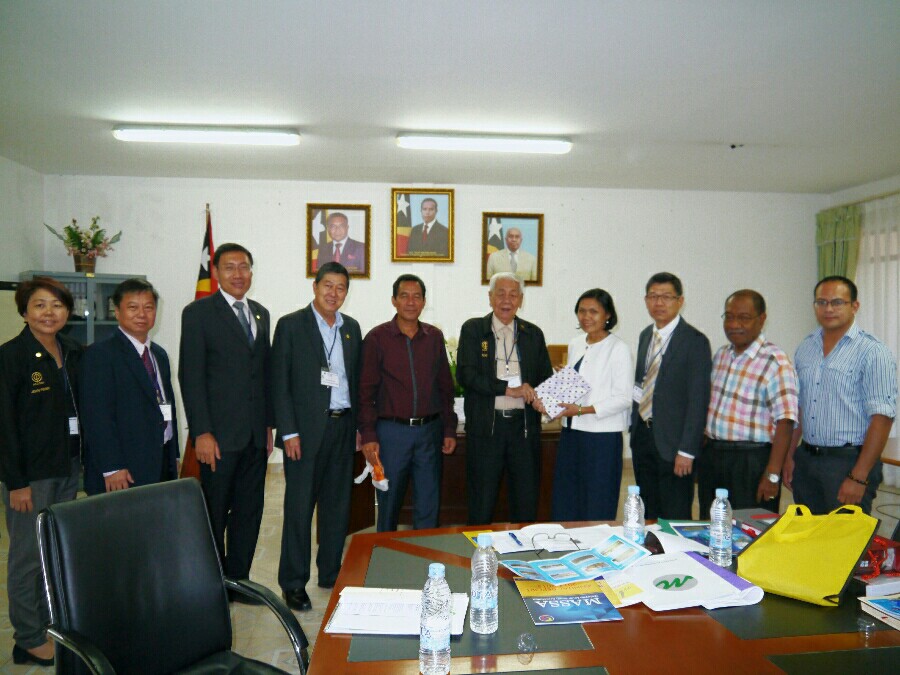
Delegates with (5th from left) Eng. Arcanjo Da Silva, Acting President of the Specialized Investment Agency of Timor-Leste (AEI)
3.3 The delegation met with the Acting President, Eng. Arcanjo da Silva and officers from the newly formed Specialized Investment Agency of Timor-Leste, also known as “AEI” – Agencia Especializada de Investimento Timor-Leste. This is a one-stop agency for Investment and Export Promotion that came into effect on 1 January 2015 replacing TradeInvest Timor-Leste with the following mandates:
3.3.1 Organize promotional activities and attract private investment and reinvestment as well as export promotion such as visiting missions, fairs, conferences, seminars, expos, markets and others, within and outside of Timor-Leste.
3.3.2 Establish partnerships or other forms of cooperation with public and private entities, nationals and internationals, in collaboration with other relevant and competent authorities.
3.3.3 Promote training activities for the economic agents, among others, hold conferences, seminars and other initiatives, in order to disseminate legal regime applicable to private investment or reinvestment and external trade.
3.3.4 Produce six monthly reports on the opportunities and advantages of private investment or reinvestment or export of goods and services as well as brochures or other promotional materials.
3.3.5 Coordinate and promote, in a strategic linkage with government agency responsible for foreign affairs, the activity developed by the economic diplomacy of Timor-Leste abroad.
3.3.6 Act as One-Stop-Shop service for reception and guidance of private investors, providing them with all the information relating to private investment or reinvestment in the country.
3.3.7 Ensure the processing of requests for Investor Certificate or Special Investment Agreement, in coordination with other public authorities and agencies involved to obtain the permits, visas, registers and licenses necessary for the approval or implementation of investment projects or reinvestment in Timor-Leste.
3.3.8 Record all requests for Investor Certificate and Special Agreement on Investment.
3.3.9 Enter into agreements with private investors for the implementation of investment projects or reinvestment in Timor-Leste.
3.3.10 To monitor compliance with legal and contractual obligations of private investors and the obligations contained in the Investor Certificate or Special Agreement on Investment, determining the expiry or revocation in case of total or partial non-compliance with legal or contractual obligations of the investors.
3.3.11 To provide support for investments in the country in order to foster and promote reinvestment.
3.3.12 Cooperate actively with the Public Administration in the study, design and implementation of policies and procedures that facilitate and accelerate private investment or reinvestment in the country, including the drawing up of protocols or other forms of cooperation that will allow coordination between departments and agencies.
3.3.13 To study and recommend to the member of Government responsible to adopt economic, legislative, regulatory and financial measures, whenever necessary or convenient to encourage private investment or reinvestment or foreign trade.
3.3.14 Practice other acts determined by its Statute or other applicable legislation.
Source: http://www.invest-tl.com/
3.3.15 The delegation was informed:
• Investments of more than USD20 million require the approval of the Council of Ministers.
• Investments papers submitted to AEI will be evaluated to determine what kind of incentives will be granted to the business.
• Some of the incentives include tax holiday of up to 5 years in Dili, and from 8 to 10 years for investments outside Dili. Corporate/income tax is currently 10%. 50% discount on rental for lease of government land, import tax of 2.5% and export tax of 4.0%, etc. O&G related industries are taxed at up to 30%.
• 100% foreign owned businesses are allowed. Foreign investors cannot own land, but can negotiate for leases.
• The foreign investment law is being drafted and will be put to the Government for approval in February or March 2016.
• To qualify for the incentives, initial investment capital (minimum 50% in cash) required is USD1.5 million.
• Joint ventures require a minimum capital of USD750,000 of which local investment must comprise 75% of the JV.
• Domestic investment require a capital of USD50,000.
3.3.16 It was noted that the Foreign Investment Laws were still work-in-progress for the time being. The Foreign Investment Laws are expected to be in place by 2016.
3.4 A networking meeting, arranged by the Malaysian Embassy in Dili, was held on 13 October 2015 at the Orchid Room of the Timor Plaza Hotel & Apartments. Timorese business people from a wide range of business and sectors came to meet the delegation.
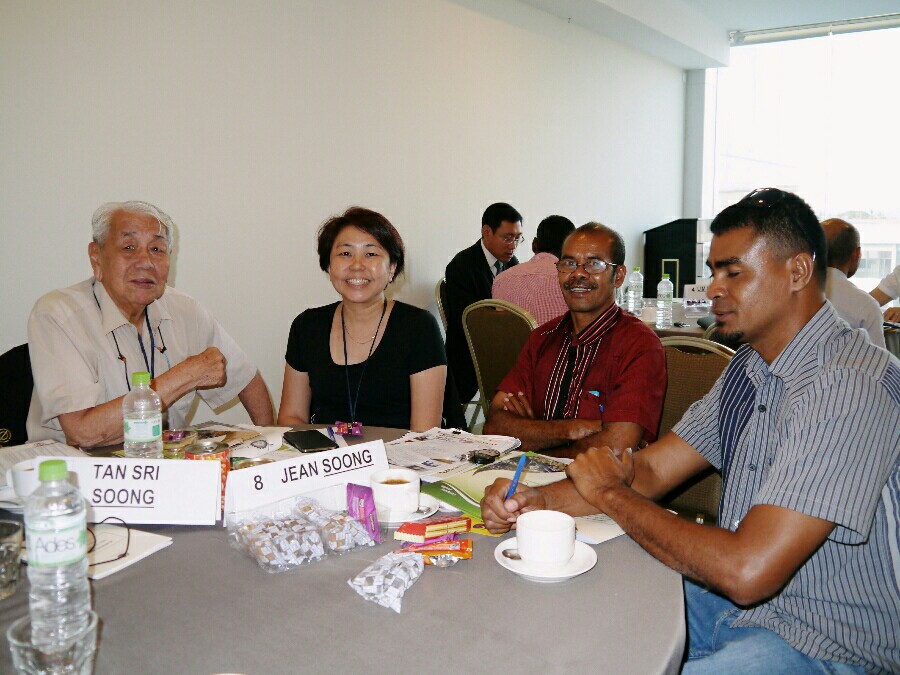
(left to right) Tan Sri Dato’ Soong Siew Hoong and Ms Soong Jean Penn meeting with Timorese businessman at the Timor Plaza Hotel
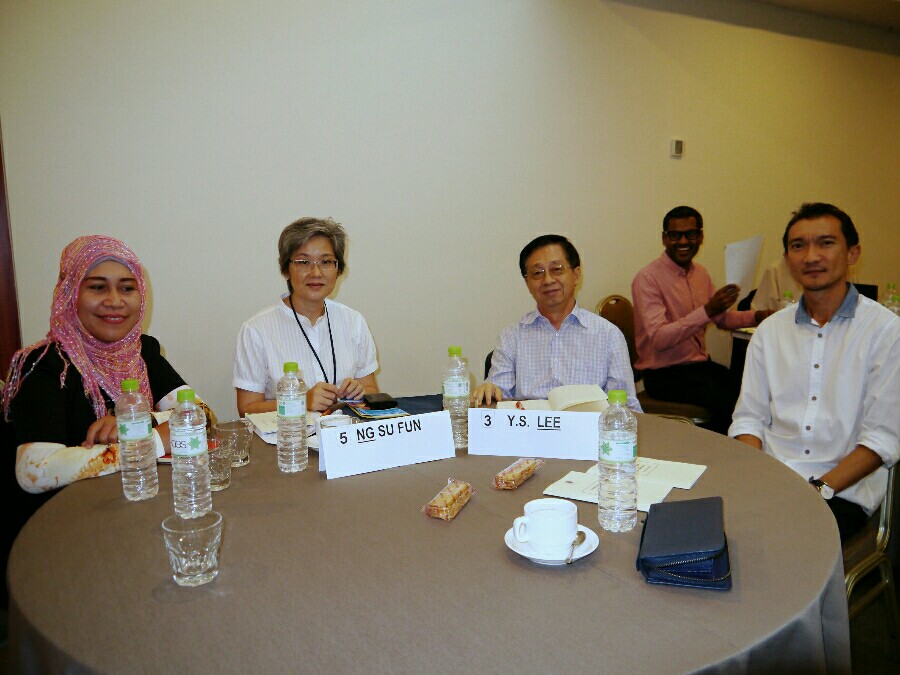
(2nd from left) Ms Ng Su Fun and (3rd from left) Mr Lee Yai Sin meeting with businessman from Timor-Leste
3.5 The delegation visited the Dili Port Authority (APORTIL) and met the Director who informed as follows:
1. There are plans to build a new deep-sea port at Tibar Bay. The bidding process for Tibar Port is under way and tender bids are expected to be out by end 2015. This will be a PPP project. Tibar Port development is expected to require a budget of USD200 million. The Port will have a depth of 16m. The current port at Dili will be used for passenger ferry services when the Tibar Port is operational. Dili Port has a depth of 7.5 meters and currently has a thoughput of 50,000 TEU/year. Main imports come from China and Indonesia (Sulawesi). Rice is mainly imported from Vietnam.
2. Containers go into TL full but go back empty because of the lack of goods for export from TL.
3. The fishing methods in TL are still traditional and have the potential to be further developed.
3.6 The Chamber of Commerce & Industry of Timor-Leste (CCI-TL) arranged a meeting with the delegation on 14 October 2015 at Restaurant Zella in Dili.

(Standing) Eng. Joao B.F. Alves, Vice-President of the CCI-TL asking a question during the meeting between the delegates and the Timorese businessman
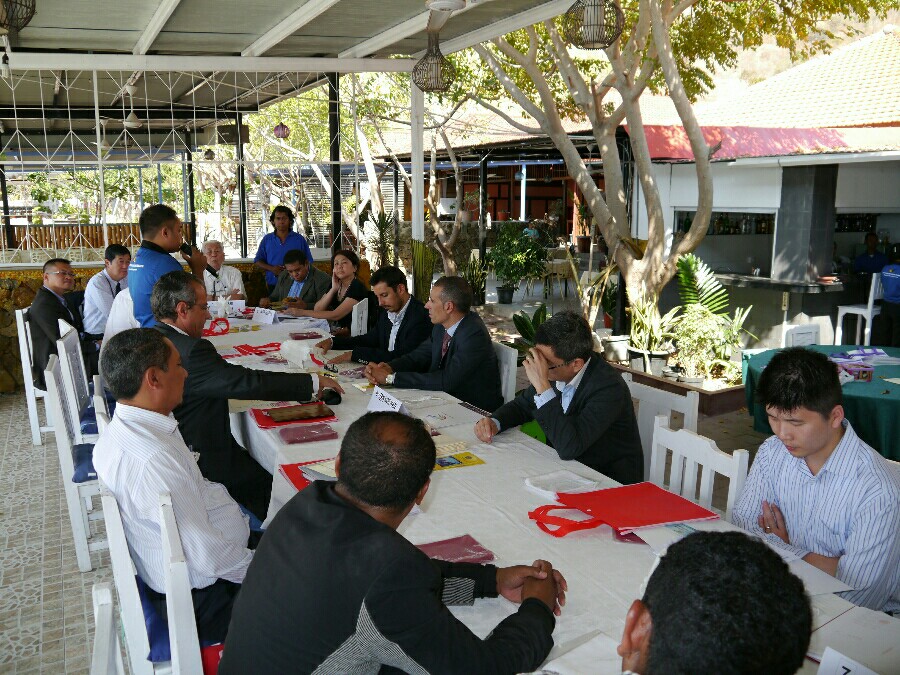
Meeting in progress between the Malaysian delegates and Timorese businessman at the Restaurant Zella in Dili
3.6.1 The Chamber of Commerce and Industry of Timor – Leste (CCITL) is the foremost Chamber of Commerce and an umbrella organization representing business associations in Timor – Leste. CCITL was established following the National Congress held in Dili on 16 – 17 April 2010. The objective of CCITL is to represent the needs of its members in policy advocacy and representation and deliver a range of business services to enhance the skills, knowledge and performance of the businesses its represent to achieve private sector growth. The CCITL aims to be a strategic partner for economic growth to the government as well as a trusted third party for businesses. With the establishment of a functioning Chamber of Commerce and Industry, the private sector will have a united voice representing their business needs and aspirations for the years to come.
Though still in its infant stage, the CCITL hopes to develop and deliver a range tailored business services and solutions to assist its private sector’s growth. This will include the implementation of self-regulatory instruments and processes to assist with the classification of businesses to develop a strong, viable and competitive private sector.
Through these initiatives, the business community hopes to increase its efficiency and productivity leading to new trade, business & investment opportunities and reduced private sector dependency on public sector spending to sustain its business growth.
With the implementation of a number of initiatives targeting business growth, CCITL hopes to gradually become a sustainable organization representing the interests of Timor – Leste businesses and also a strategic partner for national development with a key role on Timor Leste’s economic growth.
The meeting was chaired by the CEO, Sr Nuno Trindade while one of the Vice-Presidents, Eng. Joao B.F. Alves, gave a welcome speech. Leader of the MASSA Delegation, Tan Sri Dato’ Soong Siew Hoong, gave a reciprocal speech.
3.6.2 There was a signing of a MOU between Probase Manufacturing Sdn Bhd, Mr Seow Cheng Soon and Ruvic Group Lda, Mr Rui Castro witnessed by Mr Khairul Nazri Mohamad Taib, Second Secretary of the Embassy of Malaysia in Dili and Eng. Joao B.F. Alves, Vice-President of the CCI-TL.

Signing of MOU between Probase Manufacturing Sdn Bhd, Mr Seow Cheng Soon and Ruvic Group Lda, Mr Rui Castro witnessed by (1st from right) Mr Khairul Nazri Mohamad Taib, Second Secretary of the Embassy of Malaysia in Dili and (4th from left) Eng. Joao B.F. Alves, Vice-President of CCI-TL
The participants then commenced to introduce themselves and their business interests, after which, there were individual meetings between the Malaysian and Timorese business people.
3.7 Meeting with the Minister for Public Works, Transport & Communication
The delegation met with the Minister for Public Works, Transport & Communication, H.E. Gastao Francisco de Sousa, at his office. He welcomed the delegation to visit and explore business opportunities in TL.

Meeting with (3rd from left) H.E. Gastao Francisco de Sousa, Minister for Public Works, Transport & Communication, Timor-Leste
The Minister acknowledged the need for development partners especially from private sector to assist his country to develop infrastructure requirements. The meeting called on the Minister to extend the Government’s co-operation to avail the business opportunities for infrastructure development in TL to Malaysia.
The Minister then immediately called on his agencies to meet our delegation, that is, Director of SENAI Vocational Training Center and the Director-General of Water & Sanitation.
3.7.1 Meeting with Director of SENAI Vocational Training Center
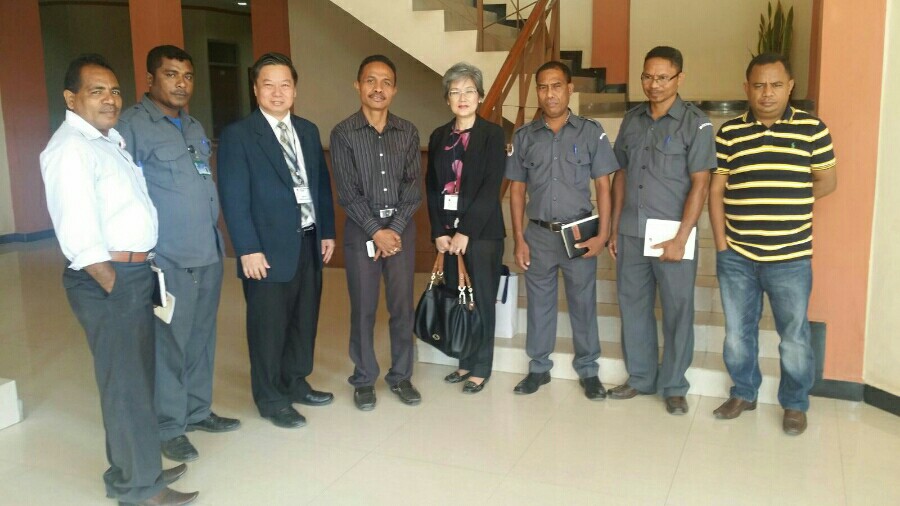
Meeting with (4th from left) Mr Lourenco da Silva Gusmao, Director of SENAI together 3 department directors
The Director of SENAI, Mr Lourenco da Silva Gusmao, together with three departmental directors met our delegation.
Initial discussions revealed that this training center provides vocational training to school leavers (after 11 years of formal primary and secondary school). SENAI welcomed the offer to our delegation to assist with curriculum and course content for vocational courses, technical and management courses for management, supervisors and skilled workers.
3.7.2 Meeting at the Ministry of Public Works, Transport & Communication with the Director-General of Water and Sanitation
The Director-General (DG) of Water and Sanitation, Mr Joao Pereira Jeronimo met our delegation upon the recommendation of the Minister of Public Works, Transport & Communication.

(left to right) Mr Joao Pereira Jeronimo, Director-General (DG) of Water and Sanitation, Ms Ng Su Fun and Mr Rui Castro of Ruvic Group Lda
The DG acknowledged that TL requires a comprehensive master plan to address the infrastructure requirements for water and sanitation. The country is subjected to distinct dry and wet seasons and presently do not have adequate water storage infrastructure to meet the country’s water needs especially during the drought/dry seasons.
Water source for most of the population is via well water only and is free. The town of Dili has tapped water facilities (charges are minimal) but this infrastructure is in need of upgrading. Dili has a population of 200,000 to 300,000 people.
The DG welcomed the idea for investment in infrastructure for Water and Sanitation.
The population of TL is 1.2 million, spread out all over the country. Though there are about 7 main cities including Dili, a small population size is a challenge as economies of scale may not be present.
The DG advised that ADB is undertaking a study of the water requirements of TL and may be ready for the Council of Ministers’ review by 2016.
3.8 The delegation also did a market survey at two major shopping malls in Dili, that is, Leader Supermarket and Timor Plaza (comprising shops, offices and hotel). These two malls are located adjacent to each other.
4. Findings of the Mission
4.1 Foreign Investment Law
The meeting with AEI gave us a brief understanding of TL’s Foreign Investment Law, which is still currently work-in-progress. We look forward to the promulgation of these laws soon.
4.2 Business & Work Culture
4.2.1 Unemployment is approximately 12%, mainly due to lack of industries, lack of entrepreneurial capabilities and lack of capital. Current bank business lending rates range from 9% to 12%.
4.2.2 There are 3 main banks in TL, ANZ Bank (Australian), Banco Nacional Ultramarino (Portuguese), and Bank Mandiri (Indonesian). Foreign labourers (especially Indonesians) seem to be hired mostly to undertake construction work. In the service industry, Singaporeans have established a few Chinese restaurants with chefs from Malaysia.
4.2.3 There are many NGOs operating in TL, funded by foreign donor agencies. Hence many expatriate staff of NGOs are stationed in TL. The presence of these NGOs and their families has given rise to the opportunity to develop real estate accommodation and educational requirements, and other services they are accustomed to.
5. Mission Outcome/Conclusion/Recommendations
5.1 Based on feedback gathered from the delegates, there is potential to export products and services for infrastructure development for roads, ports and airports (cranes and related machineries and equipment), post-harvest and food processing machineries, ship-building, LED lights, etc. The present infrastructure for transportation that is, ports, airport, roads are congested and strained and require upgrade/new facilities.
5.2 Export/Import – TL imports most of its requirements (at least 90%). The supermarkets reveal many food items are imported from Portugal/Indonesia and ASEAN. Members of the mission felt there was opportunity to export a myriad of Malaysian processed food items. Once these items are accepted, there is potential to set up import substitution industries in TL. Perhaps a ‘Malaysia Showcase’ event may be organized in the near future.
5.3 Resources Available in TL – TL exports raw coffee beans to USA. The mission did not have the opportunity to travel out of Dili to look at the agricultural potential. However, there were enquiries from the business networking meetings for machineries to process post-harvest resources.
5.4 Fishing Industry – Fish harvesting methods are nascent. As such, harvest is limited. TL requires marine infrastructure across the entire value chain to develop its marine industry.
5.5 Tourism – We understand that the waters off TL have good diving spots teaming with exotic marine life. This industry is not yet well known. There are no 4-5 stars hotels in Dili. Tourism infrastructure has many opportunities that can be developed further.






